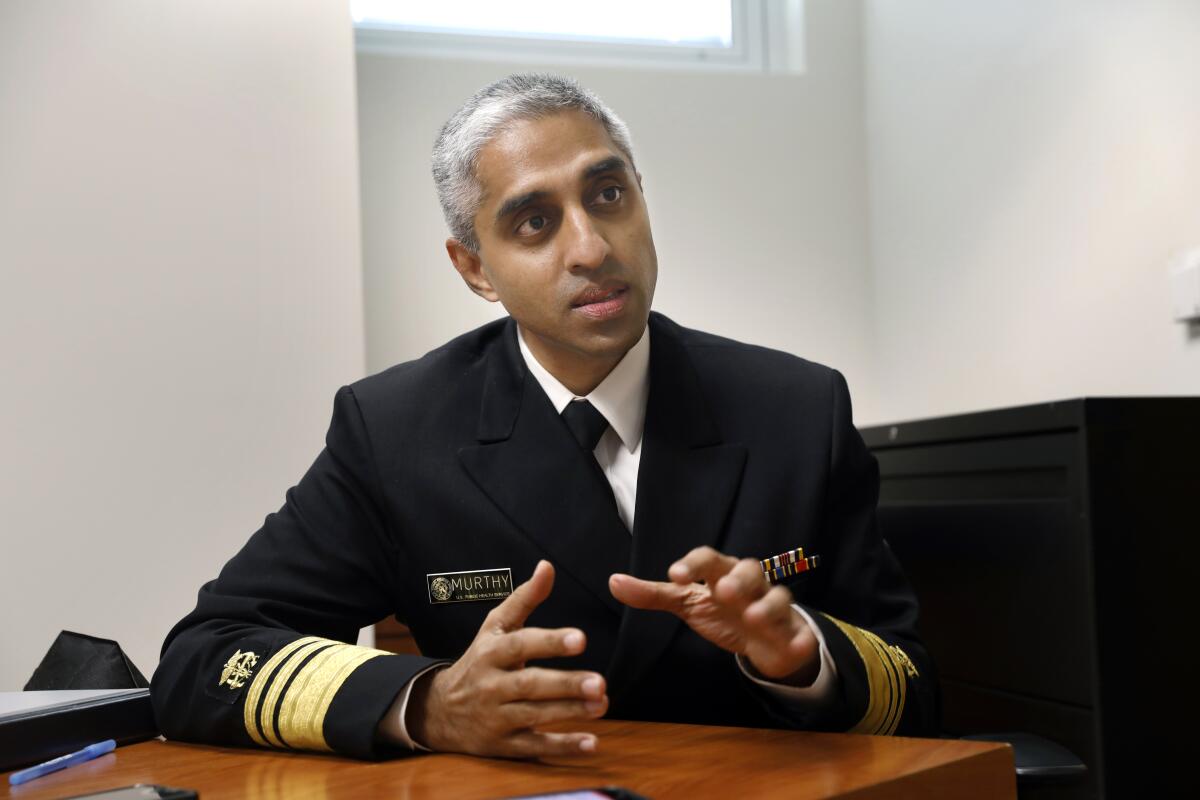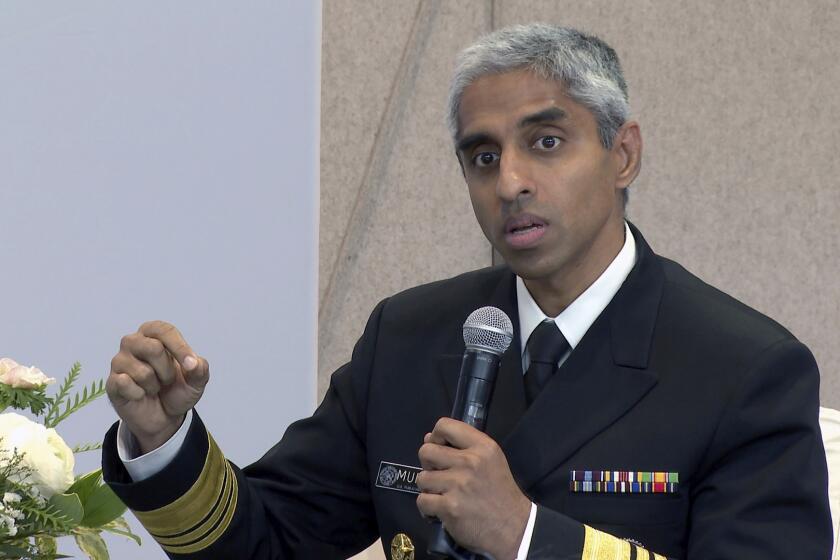Surgeon general was warned by his mom to avoid politics, but he jumped into the fray anyway

- Share via
MIAMI — The gold and silver trophies packed in the china cabinet of Dr. Vivek H. Murthy’s childhood home boast the surgeon general’s many talents, from dance performances to math competitions.
Growing up in a Florida suburb, it seemed to his family that Murthy could succeed at just about anything.
But when a middle school world history teacher suggested he might make a good secretary of state, his mom intervened.
“She got really worried,” Murthy told the Associated Press, while his mom giggled. “She called my dad. She said, ‘You need to come home and talk to him because he’s thinking about going into politics.’”
Now, in his second term as the “Nation’s Doctor,” Murthy hasn’t run from the political, as his mother hoped. He’s charged toward it.
He’s taken on powerful tech companies, accusing their addictive algorithms and dangerous content of making the country’s children mentally sick. He’s asked Congress to approve a warning label on social media on platforms such as Instagram or TikTok. In June, Murthy released his most politically charged report, declaring that gun deaths and injuries had become a public health crisis.
Focus on guns
Murthy attracted Democratic President Obama’s attention while Murthy was an internist at Brigham and Women’s Hospital in Boston, when he organized doctors to lobby for passage of the Affordable Care Act. The group also lead him to his wife, Alice Chen, who signed onto his letters from Los Angeles, where she was a doctor. The two bonded over text messages and phone calls.
The U.S. surgeon general is declaring gun violence a public health crisis, driven by a growing number of injuries and deaths involving firearms in the country.
Nominated by Obama as surgeon general, Murthy made comments calling guns a healthcare issue, something that delayed his confirmation until late 2014. He was fired from the post by Republican President Trump but returned to the job under the Biden administration in 2021. He collects an annual salary of $191,900 in the position.
As surgeon general, Murthy largely stayed quiet on gun violence, until now.
He says gun deaths and injuries had increased so much that he could not ignore it. Firearm injuries are now the leading killer of U.S. children, surpassing car crashes and cancer.
“When you hear these stories again and again from middle school students, from high school students and college students, those stories stick with you,” Murthy said. “It was inescapable to me that we had to do something about this.”
Murthy called on Congress to ban large-capacity magazines for civilian use, require universal background checks for gun purchases, restrict gun usage in public spaces and penalize people who fail to safely store their weapons.
Doctors and Democrats praised the surgeon general’s report. Republicans jeered. The National Rifle Assn. called it a “war on law-abiding citizens.” Sen. Mike Braun (R-Ind.) accused him of “flip-flopping,” noting that Murthy had told him gun violence wouldn’t be a focus of his term.
Murthy believes his recommendations, which have no teeth, might move the conversation. He sat down with the AP just four days after Trump had been nicked in the ear with a bullet from a would-be assassin during a campaign rally in Pennsylvania.
“My hope is that we can shift looking at it as a polarizing and political issue and see it for what it is, which is a public health issue that affects all of us, from people in small communities in America to people who [are] running for high office in our land,” Murthy said.
The surgeon general also emphasized another side effect of gun violence in his report: the mental health toll. He noted that half of U.S. teenagers 14 to 17 worry about school shootings.
Americans declining mental health
Murthy didn’t expect to tackle mental health when he was first appointed to the job a decade ago.
But loneliness skyrocketed during the COVID-19 pandemic, when people spent just 20 minutes every day with friends, a historic low. Loneliness can increase the risk of premature death by roughly 30%, he noted in 2023.
Murthy spent his time during the pandemic and in between terms consulting, raking in $2 million working with companies such as Netflix, Airbnb and Carnival Cruises, and writing a book, “Together,” focused on loneliness.
The U.S. surgeon general has called on Congress to require warning labels on social media platforms similar to those mandatory on cigarette boxes.
As a young doctor, he felt unprepared to handle the impact loneliness had on his patients, he shares in his book. It’s why he thinks his report on the topic resonates with doctors.
“And I have a theory as to why,” he said, “which is that doctors are actually seeing loneliness and mental health challenges on the front lines themselves in exam rooms, in hospitals each and every day.”
After his term ends in March, Murthy doesn’t know what’s next. But he says he wants to keep focusing on mental health and loneliness.
People are everything
Murthy traces his interest in eradicating loneliness back to the Miami suburbs, where he retreated last month with his wife and two young children to spend a few summer days under the palm trees of his childhood home alongside his parents, sister and grandmother.
It’s where he learned about the power of relationships. First, from watching his parents, immigrants from India, carve out a community in a city where they knew no one when they arrived. Then, as he grew older, helping his parents visit patients’ homes for his dad’s medical practice.
“Whenever they had a patient who was in need, a friend who lost a job or lost a loved one, they would be there on the phone or in person, bringing food or just sitting by the bedside and holding their hand,” Murthy said of his parents, Myetraie and Hallegere.
Even in the July humidity and heat, his family crowds around the kitchen to fry dosas, an Indian crepe, and kesari bath, a sweet raisin wheat mix, over the hot oven. His mother stuffs plastic bags full of food, insisting visitors take one home. Murthy’s 7-year-old son wraps himself around his father — and won’t let go — as dinner is served in the kitchen.
Family meals are a longstanding tradition that Hallegere Murthy passes on to his patients.
“Family unity and family interaction is very important, especially if the only time you all can be interacting is during the dinner time,” he said.
Seitz writes for the Associated Press.
More to Read
Sign up for Essential California
The most important California stories and recommendations in your inbox every morning.
You may occasionally receive promotional content from the Los Angeles Times.












